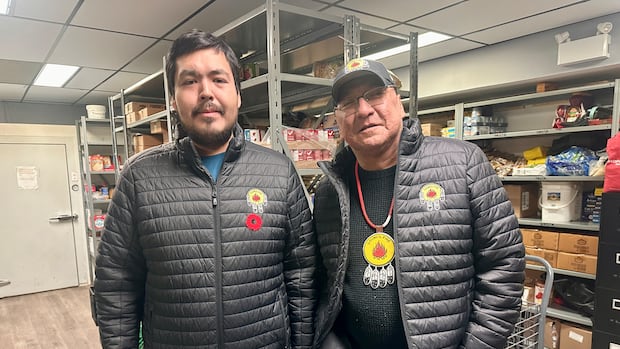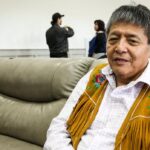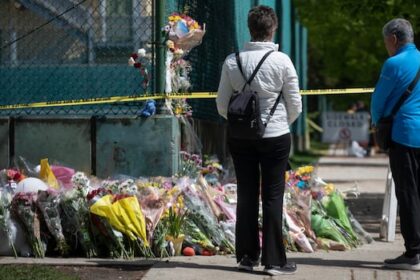TorontoSome Indigenous community leaders are raising concerns after this year’s federal budget left key reconciliation programs without guaranteed money beyond spring 2026. In the GTA, some organizations focused on urban programming worry they could be facing job losses or cuts that make it impossible to support their communities. Ottawa says Indigenous people in urban areas will continue to have services and cultural supports Talia Ricci · CBC News · Posted: Nov 13, 2025 4:00 AM EST | Last Updated: 10 hours agoListen to this articleEstimated 3 minutesThe audio version of this article is generated by text-to-speech, a technology based on artificial intelligence.GTA Indigenous centres worry about job losses, cuts due to federal budgetSome Indigenous community leaders are raising concerns after this year’s federal budget left key reconciliation programs without guaranteed funding beyond spring 2026. CBC’s Talia Ricci spoke to some organizations focused on urban programming in the GTA, who are worried they could be facing job losses and cuts. The shelves at Toronto Council Fire Native Cultural Centre’s food bank haven’t been as stocked up as they used to be, but the need is greater than it’s ever been, it says.And now the centre at Dundas Street and Parliament Street is one of the spots that fears losing funding after this year’s federal budget left key reconciliation programs without guaranteed money beyond spring 2026.Redbow Toulouse, who helps run the food bank, says it’s already struggling to serve the growing needs of the community, and budget cuts will impact hundreds of vulnerable people.”We’ve had to set capacity limits and turn people away,” Toulouse said, adding sometimes they even run out of food.”And then we run out and we have to tell people sorry we don’t have anything to give you,” he said.The centre, under the umbrella of Indigenous Friendship Centres across the country, is funded by the federal government’s Urban Programming for Indigenous Peoples. The centres help Indigenous people in areas like employment, housing, food security, youth programming and mental health. The federal government says Indigenous people in urban areas who face unique challenges will continue to have access to the services and cultural supports they need. But until Indigenous community leaders see the details of what that looks like, some remain concerned.Andrea Chrisjohn is the board designate of the Toronto Council Fire Native Cultural Centre. (Talia Ricci/CBC)”The majority of the work we do is with seniors as well as residential school survivors,” said Andrea Chrisjohn, board designate for the Toronto Council Fire Native Cultural Centre.”It’s important to keep investing in them, remind them who they are and make changes from what they’ve previously experienced.”‘We’re extremely disappointed’Sean Longboat, executive director of the Ontario Federation of Indigenous Friendship Centres is calling the move a step backwards in Canada’s relationship with urban Indigenous peoples.”We’re extremely disappointed,” he said.”The Liberal government promised to enhance support for friendship centres and what it did was the exact opposite.”Longboat pointed out that since the pandemic, the need has only grown, and since the centres can’t afford to make any cutbacks, some would have no choice but to shut down.”We know this government is interested in saving costs and we are too. We know when government invests in prevention, it reduces costs in the long run.”Feds promise new funding distribution modelPascal Laplante, a spokesperson for Indigenous Services Canada, said in a statement that the government has heard the concerns raised regarding the expiry of Urban Programming for Indigenous People in March 2026. “It is important to note that while UPIP funding from Budget 2024 will be exhausted, the program will not expire but, instead, will move to a new funding distribution model for service delivery organizations, namely Friendship Centres, who will provide direct and on-the-ground program and services to Indigenous Peoples,” the statement said. It did not provide the details of what that new model would look like.As someone who attended programs at the centre when he was just seven years old, Toulouse knows first-hand how much of an impact these services can have and hopes they’ll be able to continue to providing that support to those who need it.”I’ve grown with this place. It’s helped me become the person I’ve become.”ABOUT THE AUTHORTalia Ricci is a TV, radio and web reporter at CBC Toronto. She enjoys covering offbeat human interest stories and exposing social justice issues. Talia is also an avid traveller and photographer. Her photography has appeared in various publications and exhibits. She lives in Toronto’s west end where she enjoys reading and going on long walks to discover the beauty in the city.
Thursday, 5 Mar 2026
Canada – The Illusion
Search
Have an existing account?
Sign In
© 2022 Foxiz News Network. Ruby Design Company. All Rights Reserved.
You May also Like
- More News:
- history
- Standing Bear Network
- John Gonzalez
- ᐊᔭᐦᑊ ayahp — It happened
- Creation
- Beneath the Water
- Olympic gold medal
- Jim Thorpe
- type O blood
- the bringer of life
- Raven
- Wás’agi
- NoiseCat
- 'Sugarcane'
- The rivers still sing
- ᑲᓂᐸᐏᐟ ᒪᐢᑿ
- ᐅᑳᐤ okâw — We remember
- ᐊᓂᓈᐯᐃᐧᐣ aninâpêwin — Truth
- This is what it means to be human.
- Nokoma











